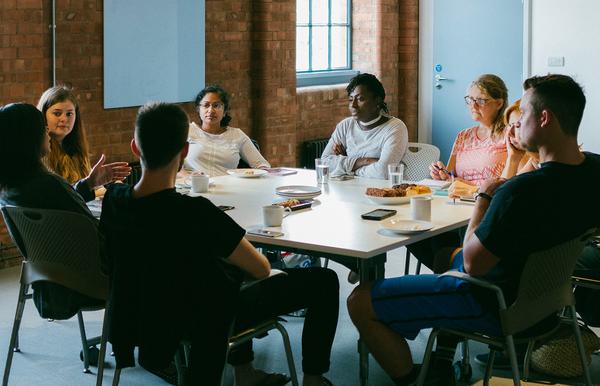Head of Theology Phoebe Hill explains her new role that’s shaping Youthscape’s dynamic, reflective, and theological approach to research.
Hi, I’m Phoebe, and I’m Head of Theology at Youthscape.
Now – I know what you’re thinking. What on earth is a Head of Theology?
When I mention my mysterious new job title to friends or people I meet, I first have to explain that no, I’m not Head of Geology (yay rocks!). Even with this explanation, I still receive fairly blank looks. Being ‘Head of Theology’ feels reminiscent of the fictitious ‘Director of Better’ from the BBC’s Mockumentary series W1a. To put it bluntly, it sounds a bit nothingy and made-up. So why does Youthscape need a Head of Theology?
A research problem
In 2015 I joined Youthscape to set up The Youthscape Centre for Research. At the time it felt as though there was a dearth of accessible research around youth ministry in the UK, and we wanted to be part of providing churches and youth workers with the resources and thinking to equip their ministry. We also wanted to better understand the work we do at Youthscape, and to be able to analyse and evaluate our offering to young people. We’ve since published several research reports (see Losing Heart and No Questions Asked) and currently have more research projects on the go than ever (you can find out about them here). We’ve also been delighted to see many others release research reports in recent years (for example Scripture Union, Youth for Christ and Prayer Spaces in Schools) and to see a greater appetite for research and reflection among practitioners across the board.
We’ve had a growing sense, however, that something is missing. After releasing our first major research report, Losing Heart, we held a small focus group to discuss the findings. Overwhelmingly, the feeling from this group was that although the report captured something of the truth about what was going on in the UK Church, it lacked a theological component. It fed into the ‘decline narrative’ with regard to young people and the Church and lacked a hopeful message, a motivator and inspiration for change.
Moments like these have made us ponder afresh how we do research at Youthscape. It’s made us realise that we must balance our social scientific, empirical findings with robust theological reflection, if we are to encourage and support the Church. It’s not always easy to bring these two elements together, and it can sometimes feel like forcing two friends to be at a party they don’t want to be at. But we are committed to finding ways of thinking theologically about our research at Youthscape.

A new way of thinking
So how do we share data in a way that motivates change, and doesn’t leave people feeling discouraged? The story of Jesus’s encounter with the woman at the well in John 4 is a favourite of mine. I’m always struck by the fact that Jesus, through this encounter, leaves the woman feeling inspired and motivated for change. He highlights the reality of her lifestyle; he does not shy away from pointing out what needs to change in her life. In other words, he does not condone her actions. However, neither does he make her feel like her past is the determinant of her future; he does not leave her feeling condemned. Instead, she walks away with a skip in her step, telling everyone about the five husbands she has had and boasting that Jesus told her ‘everything she ever did’. There is something about the way in which he cares for her that means she can stare truth in the face without feeling despair. This is the challenging balance we wish to strike with our theological research: neither condoning the current status quo and claiming that everything is fine as it is, nor, at the other end of the spectrum, leaving people feeling deflated and condemned. We don’t have all the answers about how to do this, but it’s something we are committed to continue exploring.
Part of my role – as Head of Theology – is therefore to wave the theological flag in all areas of our practice and research, and to seek to address our historical imbalance (which I take a lot of responsibility for) in this regard. There are four key areas and focuses for our theological work, which are as follows:
- CREATE. We will carry out pieces of theological research to further thinking in youth ministry in the UK. Our first project is funded by a Durham Common Awards Seedcorn Grant and focuses on the practice of Theological Reflection among youth ministers (in partnership with St Mellitus, Ridley Hall, St. John’s Nottingham and the Diocese of London).
- SUPPORT. We will support the wider Youthscape team in promoting theological exploration of practice. This has already begun in the design and delivery of Youthscape’s Open House project, where the team has explored the theological significance of eating together as a Christian practice.
- CURATE. We will continue to reflect on and develop our existing research. To begin with, we are working on a theological ‘corrective’ to the Losing Heart report (for the reasons explained above), and hope to produce a White Paper building on the conversations from the focus group, and exploring theologies of hope in the midst of crisis.
- SHARE. We are committed to sharing and disseminating our thinking and research in an accessible format to practitioners. This may come in the form of reports, papers, blogs, infographics, or videos, or as part of our regular publication, The Story. We also hope to facilitate and continue to be part of the wider conversation around theology and youth ministry in academic and practitioner circles.
If you have any questions, or are interested in being part of our research, feel free to email me.
For now, I’ll get back to my rocks… (joke).








